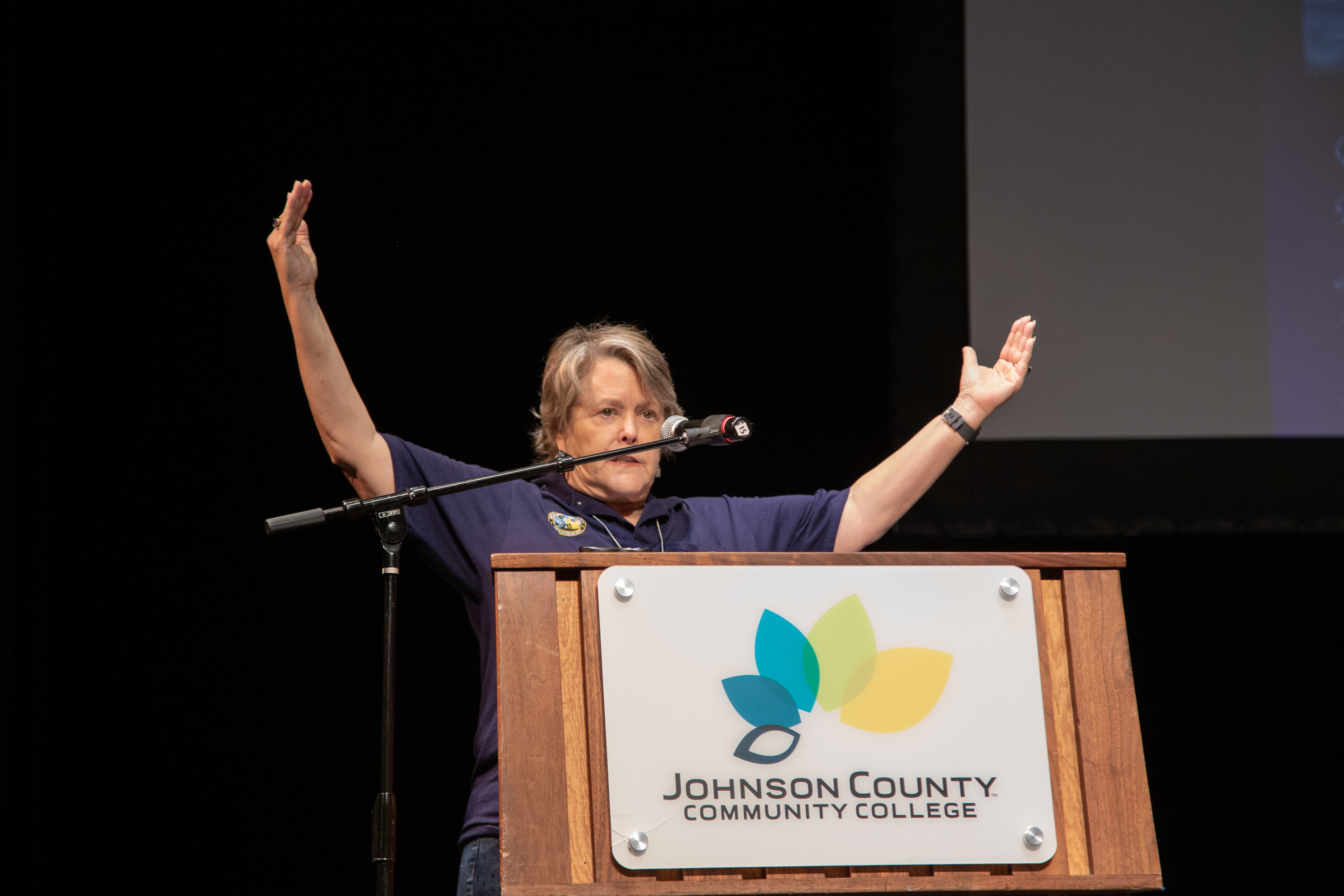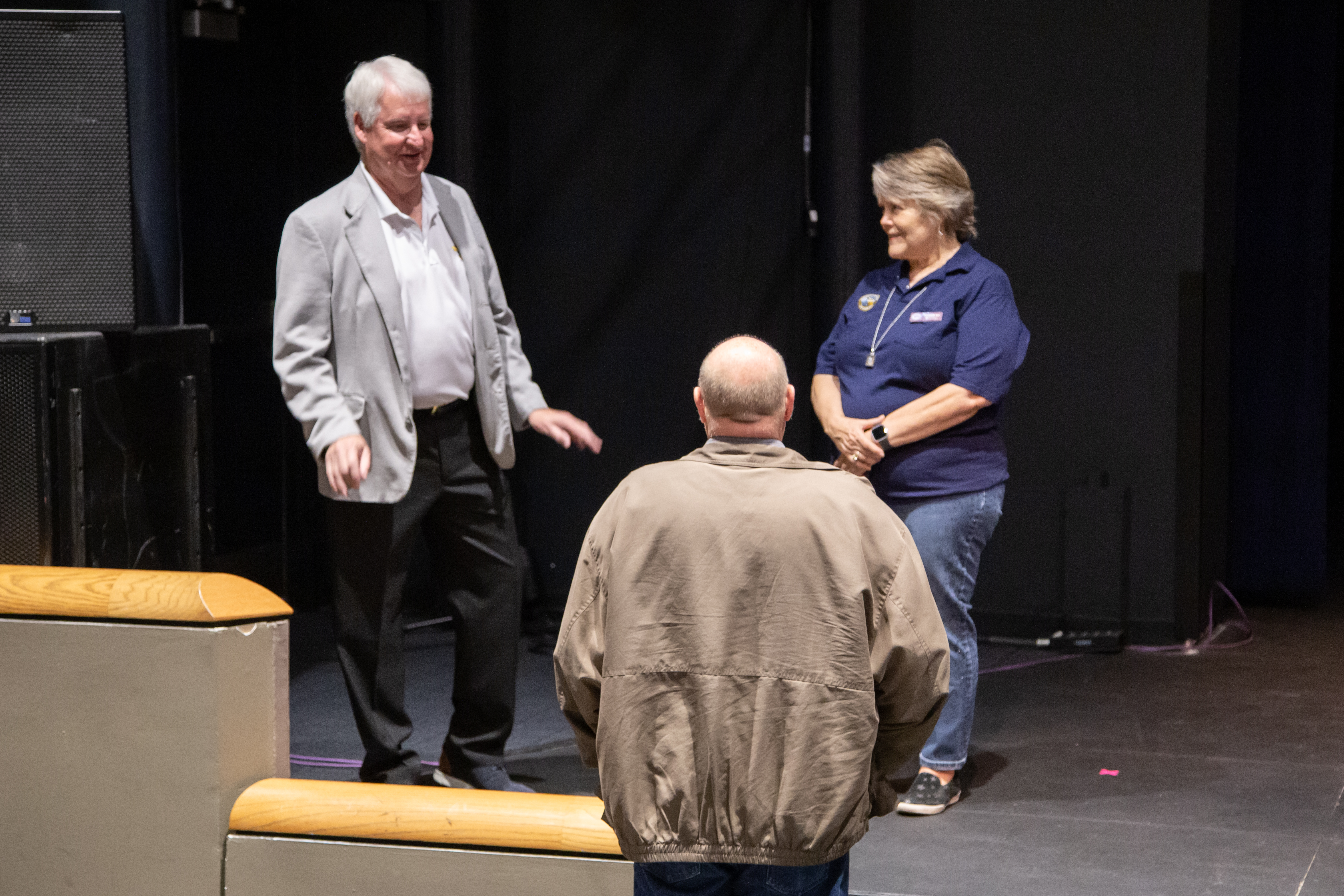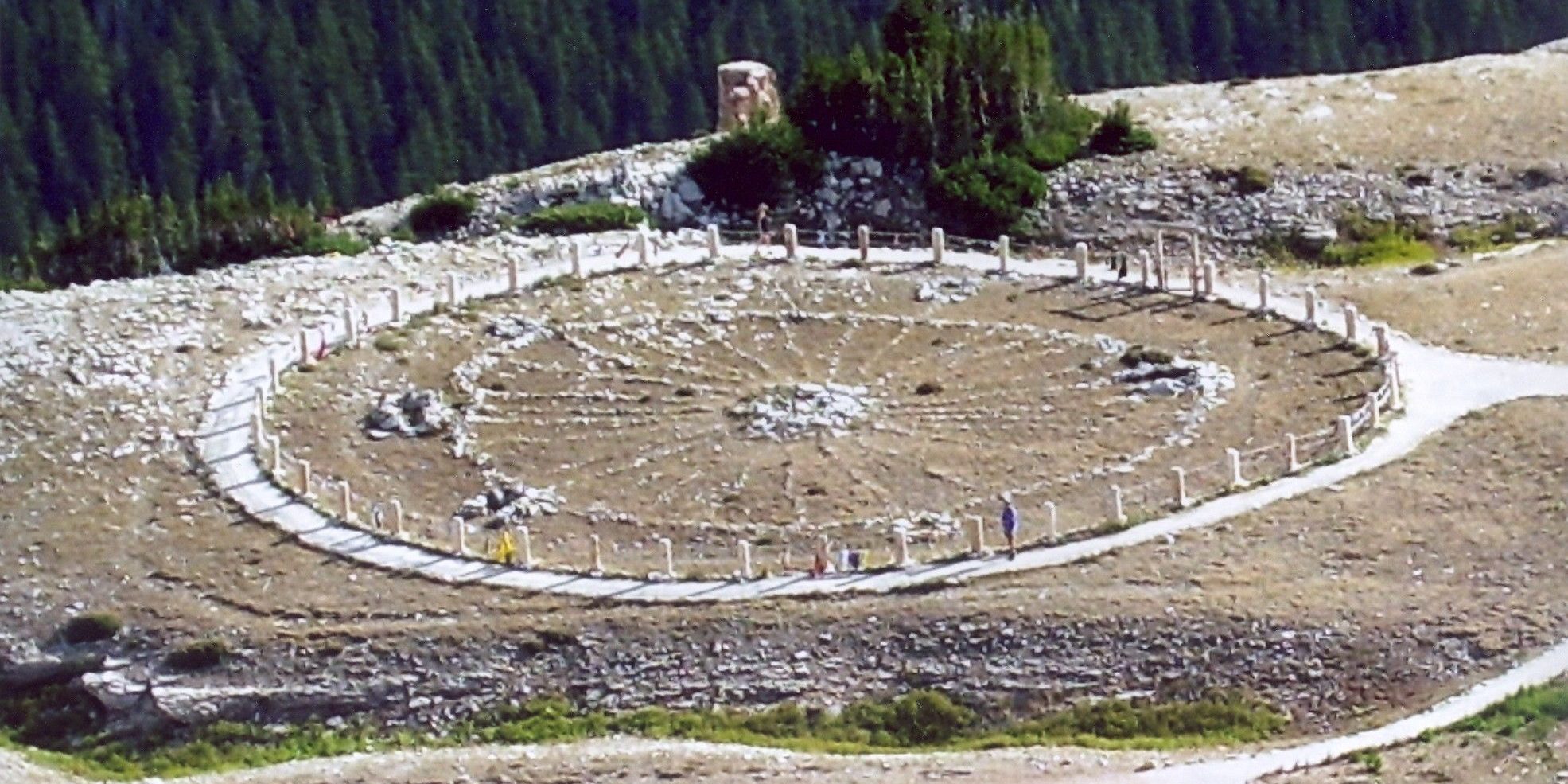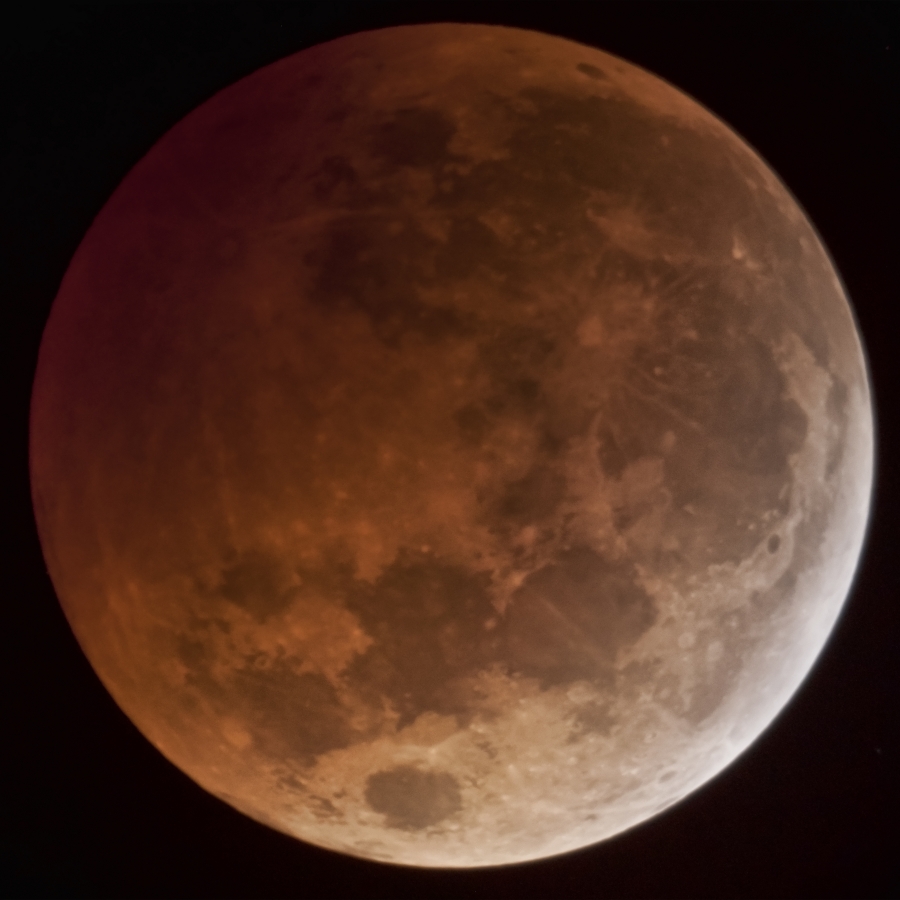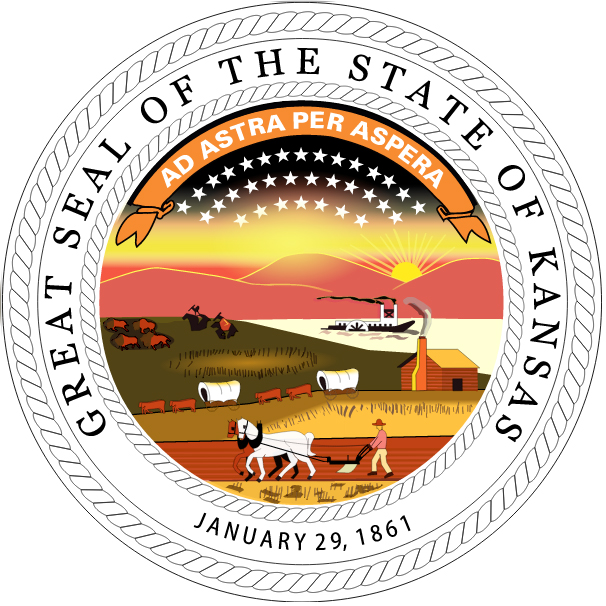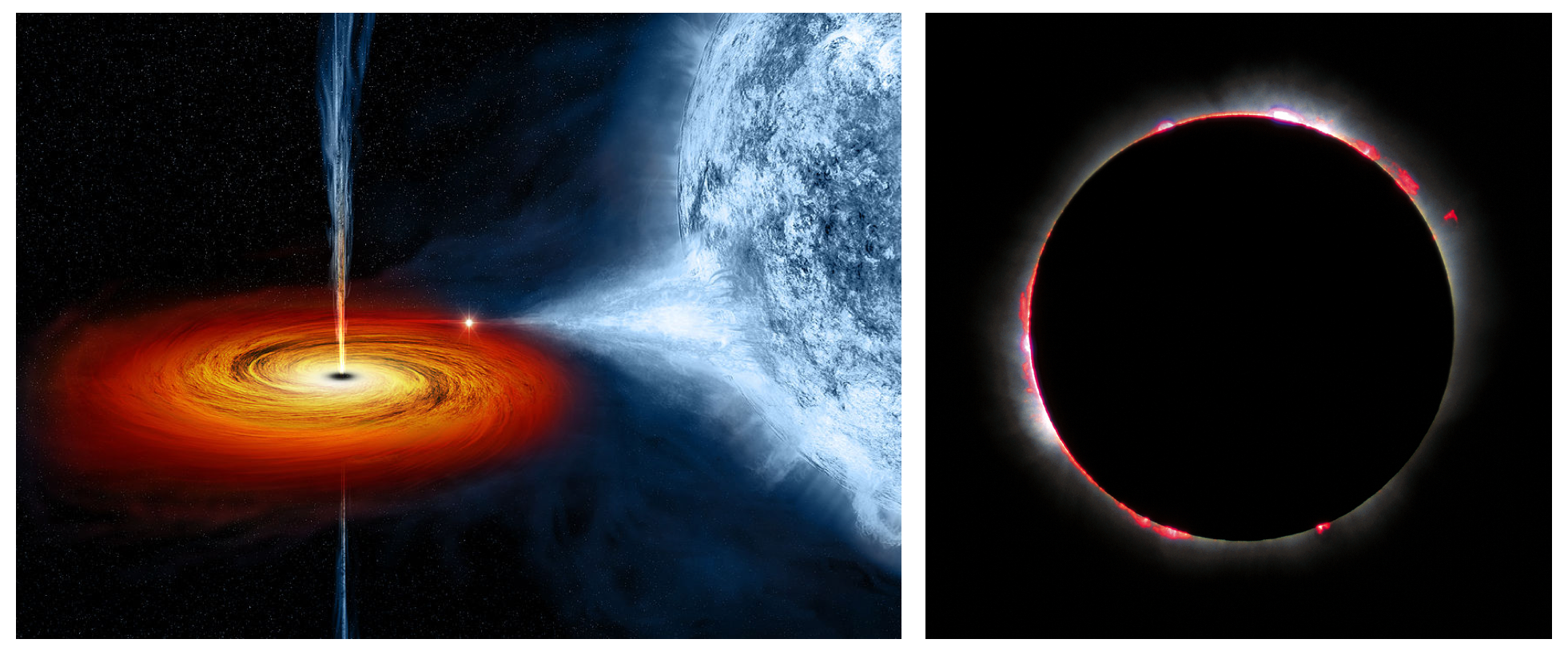For the first time, the JCCC Astronomy Department is offering its ASTR 122, Astronomy online. This is a 4-credit class, with lab. Previously, this class was only offered in a face-to-face setting. No on-campus meetings are required. All assignments, including, homework, exams, labs, and naked-eye home observing sessions, will be submitted through Canvas. If you need a science and lab credit, but also need the convenience of completing such a class online, this class will fulfill that need while introducing you to the amazing wonders of the universe!
Fall 2019 Evening with the Stars
On the afternoon of October 8, 2019, the JCCC Astronomy Department, in collaboration with Jackie Beucher, Vice President of the Astronomical Society of Kansas City, brought in former NASA astronaut Dr. Steven Hawley, to speak about the Hubble Space Telescope. The event was a limited afternoon edition of the Astronomy Department’s fall Evening with the Stars program. Unlike all previous functions provided by the department, which were open to the public, this event was open only to JCCC students, ASKC members, and JCCC faculty and staff.
Dr. Hawley flew five shuttle missions and logged 770 hours in space. Hawley also served as Director of Space Science at Johnson Space Center. He received numerous awards, including NASA Distinguished Service Awards and NASA Exceptional Services Awards. Dr. Hawley was inducted into the US Astronaut Hall of Fame in 2007. His career with NASA spanned nearly 30 years. He is currently an Emeritus Professor of Physics and an Adjunct Professor of Aerospace Engineering at the University of Kansas.
Dr. Hawley has some first-hand experience with the Hubble Space Telescope (HST). His shuttle missions included the 1990 mission to deploy the Hubble Space Telescope (HST) and the 1997 mission to service Hubble. His talk very informative, and it gave the audience some unique insights into its construction and deployment, its problems, and its servicing. He also shared several humorous stories that one wouldn’t read or hear about anywhere else.
Because of poor weather, we were unable to have the customary open house at the observatory following the talk. We were prepared to set up special telescopes to observe the Sun. Since the Sun is very quiescent at the moment, we didn’t see the cancellation of the open house a significant loss. Given that we had a NASA astronaut as our speaker, the coolness factor of the event was already off the charts!
Alarming Astronomy: Strange Sights-Past, Present and Future
The JCCC Astronomy Department will once again open its doors and telescopes for an out-of-this-world evening on Saturday, April 13, 7:30 p.m. in Craig Community Auditorium (GEB 233). We welcome guest speaker Jay Manifold of the Astronomical Society of Kansas City. Manifold will speak on “Alarming Astronomy: Strange Sights—Past, Present and Future, exploring such questions as:
- How did we ever survive 2012?
- Why didn’t the world end on March 10, 1982—or May 5, 2000—or May 27, 2003?
- Will asteroid Apophis get us anyway in 2029 or 2036?
Manifold will explore these questions and more. What makes this stuff so popular even when nothing happens? And how can we dial down the looniness?
Afterward, join J. Douglas Patterson and William Koch, JCCC professors of Astronomy, at the Paul Tebbe Observatory for a tour of the night sky. They will train our telescopes on the Moon, Mars, the Pleiades Cluster and the Orion Nebula.
About our speaker
Jay Manifold is a current member of the Astronomical Society of Kansas City and a former Vice-President, Board Member and Education Director of the organization. As a longtime volunteer and keyholder at Powell Observatory, he has delivered scores of presentations on astronomy to groups ranging from Cub Scout packs to JCCC classes, which he has assisted every semester since 2008. In fall 2009, he gave an Evening with the Stars talk titled “Asteroids, Black Swans, Global Catastrophic Risks, and How to Save Civilization.”
Archaeoastronomy: Between the Heavens and Earth
On Saturday, April 21st, at 7:30pm in the Craig Auditorium, the JCCC Astronomy Department will host its Evening with the Stars public open house event. The evening will begin with a talk by JCCC Professor of Anthropology, Dr. William McFarlane.
Archeoastronomy: Between the Heavens and Earth
How did prehistoric peoples conceive of their place in the cosmos? What was their relationship with the sun, moon, stars and other celestial phenomena? In what ways did their interaction with the sky shape their lived experience? And, how do we know? We will attempt to answer these questions by reviewing the evidence, interpretations, and implications of the emerging field of Archaeoastronomy.
After the talk, and weather permitting, Professors of Astronomy Dr. Doug Patterson and Prof. William Koch, will lead a tour of the night sky at the Paul Tebbe Observatory (CLB rooftop). Notable objects to be seen include: The Orion Nebula, The Moon, The Beehive Cluster, and Mizar and Alcor.
This event is open to the public and admission is free.
For more information about Evening with the Stars, or the JCCC Astronomy Program, contact Dr. Doug Patterson, dpatter@jccc.edu, 913-469-8500 x4268 or Prof. William Koch, wkoch@jccc.edu, 913-469-8500 x3725.
Blue Blood Supermoon!
Tomorrow morning, we get to see a particularly rare treat. We get to see the second full moon of the month (a blue moon) while the moon is at its nearest point to Earth in its orbit, perigee (supermoon), and the Moon will enter the Earth’s umbral shadow resulting in a total lunar eclipse (blood moon). So we get to see a blue blood supermoon of awesomeness!
The Moon will enter the Earth’s penumbral shadow at 4:51am, so get up early! At 5:48am, the Moon begins to enter the Earth’s umbral shadow marking the beginning of the partial lunar eclipse. The total lunar eclipse, when the Moon is fully encased in the Earth’s umbral shadow, begins at 6:51am and reaches the center of the umbra at 7:25am, a mere three minutes before moonset.
Although we won’t be able to see the entire eclipse event, we will get to see the beginning partial eclipse and the first half of the total eclipse. It does have a benefit for the photographically minded. With the eclipse happening near moonset, we will see the eclipsed moon behind familiar landmarks. This provides an opportunity to make some really engaging photographs.
You can see the full timing details at https://www.timeanddate.com/eclipse/in/usa/kansas-city.
We will have our own photographs to share after the eclipse, but we welcome your contributions as well. Share you images in the comments section below or on our Facebook page, https://www.facebook.com/JCCC.Astronomy/.
Happy Birthday Kansas
Today is “Kansas Day“, commemorating Kansas’ official admission into the Union and the beginning of statehood on this day in 1861. You might wonder why on earth the Astronomy Department is talking about Kansas state history, but there is a connection: the state motto. The Kansas State Motto is “Ad astra per aspera.” The translation of which is “To the stars through difficulties.” Of course at the time of adoption, there was no space program. Abraham Lincoln dropped the ball on that one. Kansas was, however, on the cusp of the western frontier, and many of the risks of spaceflight are inherently the same as the pioneers endured. They were on their own. When problems arose, and they did, they had to work a solution themselves.
Today, we do have a space program, and it is still difficult. That’s one of the reasons we go, though. The difficulty spurs our creativity and innovation, and through that difficulty we find ourselves and our society enhanced. So we strive to explore the space, our new frontier, and search for our place among the stars knowing that we will face many difficulties in doing so, but through those difficulties, we will grow and be enriched. Happy birthday, Kansas! Ad astra per aspera!
Evening with the Stars Fall 2017
The JCCC Astronomy Department presents
“Gravitational Waves: Waves of the Past and Waves of the Future”
This fall, JCCC Professor William Koch will explain what gravitational waves are, how they are detected and how gravitational-wave observatories may provide a completely new window into the universe through which to unravel mysteries of the cosmos.
After Professor Koch’s presentation, weather permitting, the JCCC astronomy faculty invite everyone to the Paul Tebbe Observatory (on the roof of CLB) to observe the night sky through telescopes.
Some objects of note that will be viewable are:
- Andromeda Galaxy (M31)
- The Pleiades (M45)
- Albireo
- Ring Nebula (M57)
- Uranus
- The Moon
WHEN: October 28, 2017, at 8:00pm
WHERE: The Craig Auditorium, GEB 233
COST: Free
For more information, contact either Doug Patterson, dpatter@jccc.edu, at (913) 469-8500 x4268, or William Koch, wkoch@jccc.edu, at (913) 469-8500 x3725.
The Great American Eclipse is Coming!
On August 21, 2017, there will be a total eclipse of the Sun. The Moon’s shadow will be sweeping across the United States and very near Johnson County Community College. Unfortunately, the eclipse won’t appear completely total at the college, though pretty close (99.6% maximum coverage). The eclipse will be partial for about an hour-and-a-half. Straight north of Kansas City, the start of the partial eclipse (called “first contact“) will begin about 11:40am. Totality will begin (near the blue line) at 1:07pm and will last 2min 38.2sec. Times will vary some, depending on one’s exact location.
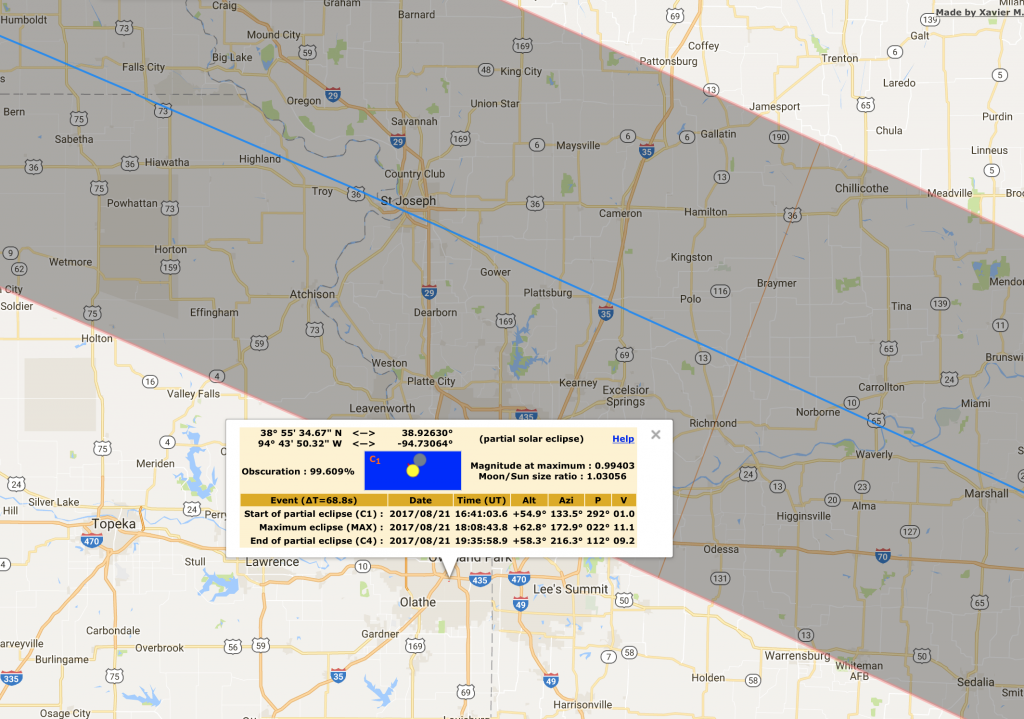
Even though the eclipse won’t be total at JCCC, there will be festivities celebrating the event. Starting at 11:30am, near “the hill”, there will be food, drinks and music. Solar glasses will be given away on a first-come-first-served basis. The CoLab is one location where you will be able to pick up a pair. The bookstore is selling eclipse t-shirts and will be selling solar glasses for $2.49 buyback hallway.
Members of the Astronomy Department will be along the path of totality observing and photographing the total eclipse. We urge students and members of the community to do the same, if possible. Here is a link to an interactive map that will give you data for other locations. Simply click on a location and the data will pop up. For those who can’t venture out, we will be attempting to live stream the event on the JCCC Youtube channel.
If you are at JCCC, it will look noticeably dimmer outside. If you are where it it total, you will see a lot more. There are features of the Sun that become visible when its bright surface (called the photosphere) is blocked. Look for solar prominences, hot gas magnetically suspended high above the Sun’s surface. They will appear a reddish in color. Look for a white fuzzy feature all the way around the disk of the Sun called the corona. The corona is the very hot upper atmosphere of the Sun. During totality you will also see stars and the planets Mars and Mercury. In fact, Mercury will be in a part of the sky that it is normally never seen! (To learn more about why that is, take one of our astronomy courses!)
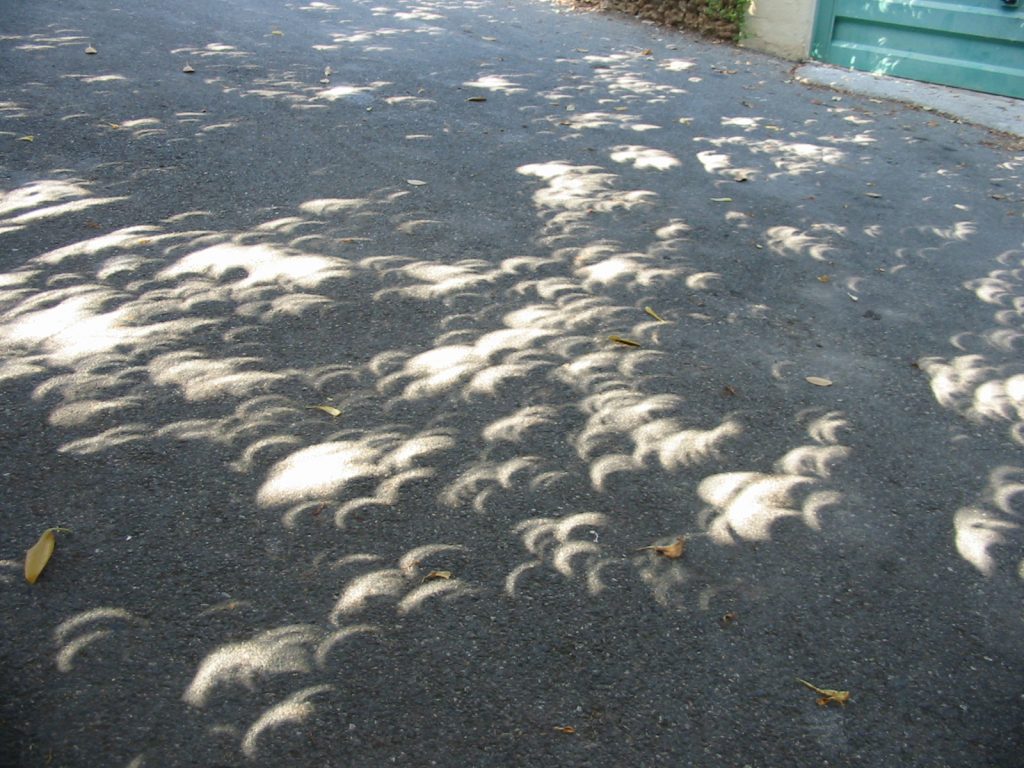
On the ground, shadows will begin to look sharper. During the partial phase, you may see light that has passed through small openings, or passed between tree leaves, creating small images of the eclipsed Sun. Just before totality, on a light surface, such as the hood of a white car, you may see mysterious shadow bands, looking like the shadow of a flowing stream of cigar smoke. Nobody is really sure what causes this, though it is widely believed to be some kind of atmospheric phenomenon.
Don’t just see the eclipse, feel it! Some claim that witnessing a total solar eclipse changed their lives. Notice the emotions that such a spectacle and change in your surroundings invokes. What do you hear? What animals can you now hear and what animals can you no longer hear? Give a quick glance at people around you. Imagine the fear that people may have experienced before anyone understood what solar eclipses were about.
After that, take a moment to reflect on how, through science, we have come to understand what eclipses are and how to predict them. Science, and the quest to understand awesome spectacles of nature, is a human activity. As such, they can involve a variety of emotions. Get excited about science! We do!
As with any observing that has to do with the Sun, we want to stress safety and common sense! One should never look directly at the Sun without proper eye protection. Cameras and other optical equipment can also be damaged or destroyed if proper care isn’t taken. Because it is hard to tell by inspection whether solar glasses are accurately rated as proper eye protection, it is recommended that you obtain solar glasses only through reputable sources (JCCC, Astronomical Society of Kansas City, etc.) When proper solar glasses are worn, you should not be able to see anything but the Sun. More information about eye protection can be found on this NASA page.
To learn more about eclipses, planets, stars, black holes and the expanding universe, enroll in one of JCCC’s astronomy courses! JCCC offers:
- Astronomy (ASTR 122) with lecture, lab and evening observing sessions at the Paul Tebbe Observatory (4 credits, lecture and lab).
- Fundamentals of Astronomy (ASTR 120), which is a fully online course (3 credits, lecture).
Late-start 12-week, 8-week classes, and winter session online classes are available.
Spring 2017 Evening with the Stars
The JCCC Astronomy Department presents From Dark Stars to LIGO: How General Relativity Shaped the Study of Gravity.
This spring, JCCC honors student Jackson Conners will explore the implications of general relativity as a theory of gravity as spacetime curvature. Topics to be examined will include black holes, gravitational waves, and the ongoing mystery of the geometry of the Universe. After Jackson’s presentation, JCCC astronomy faculty will briefly present information about the upcoming 2017 solar eclipse.
Afterward, weather permitting, several telescopes will be set up to observe the night sky at the Paul Tebbe Observatory, on the roof of CLB. Some objects of note that will be viewable are:
- The Orion Nebula
- The Beehive Cluster
- Jupiter
- The Moon
UPDATE: Due to the weather, the observing session schedule for after tonight’s talk has been cancelled. The talk will go on at 8:00pm as scheduled.
WHEN: April 29, 2017, at 8:00pm
WHERE: The Craig Auditorium, GEB 233
For more information, contact either Doug Patterson, dpatter@jccc.edu, at (913) 469-8500 x4268, or William Koch, wkoch@jccc.edu, at (913) 469-8500 x3725.
Dark Energy Video
To learn more, sign up for a Johnson County Community College astronomy class! We offer face-to-face classes, with lab, and online classes. Search for ASTR 122 and ASTR 120 in the Class Schedule.



